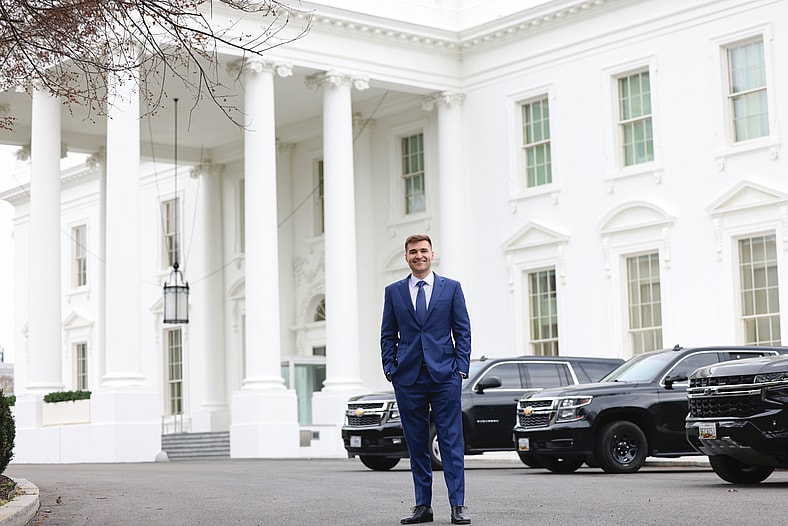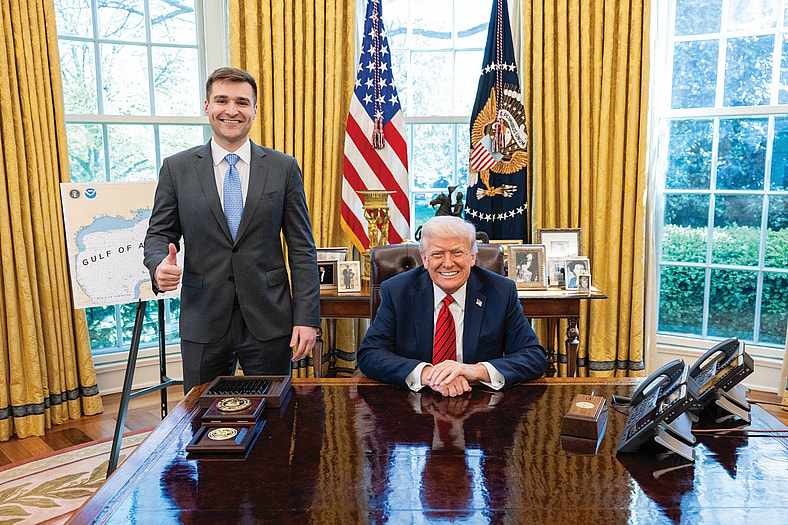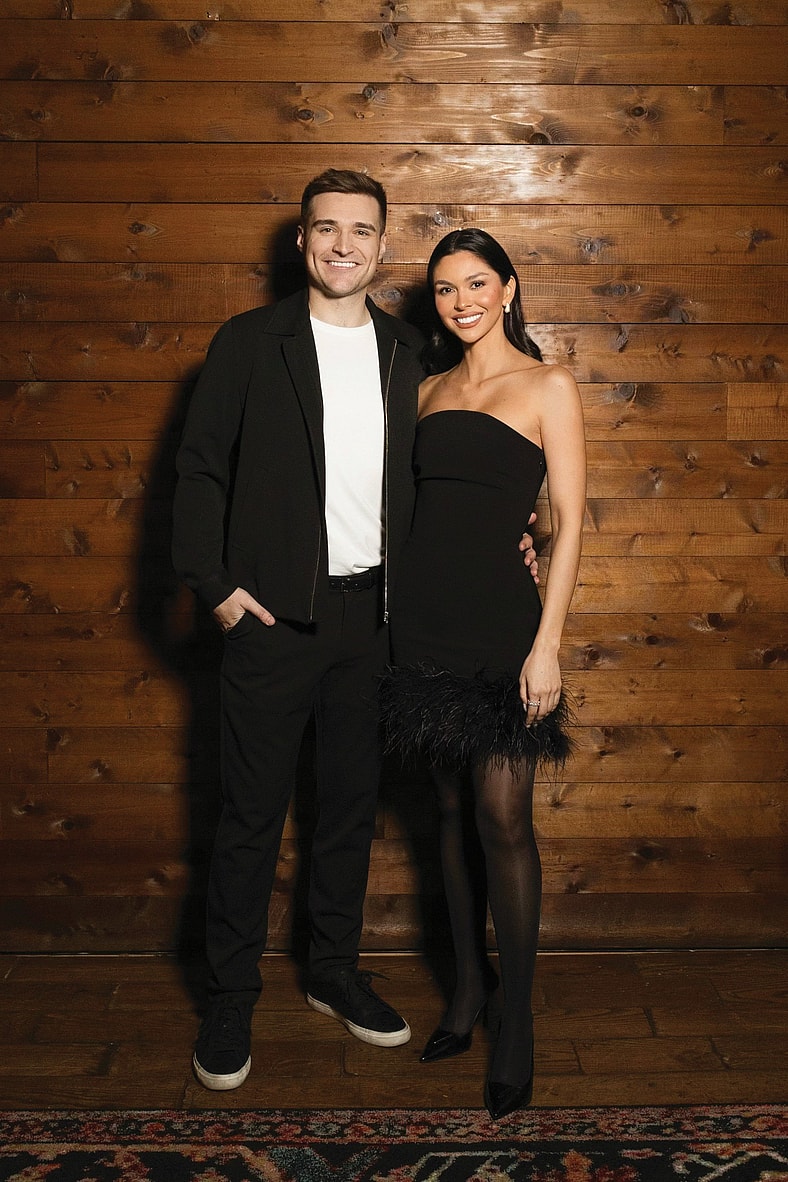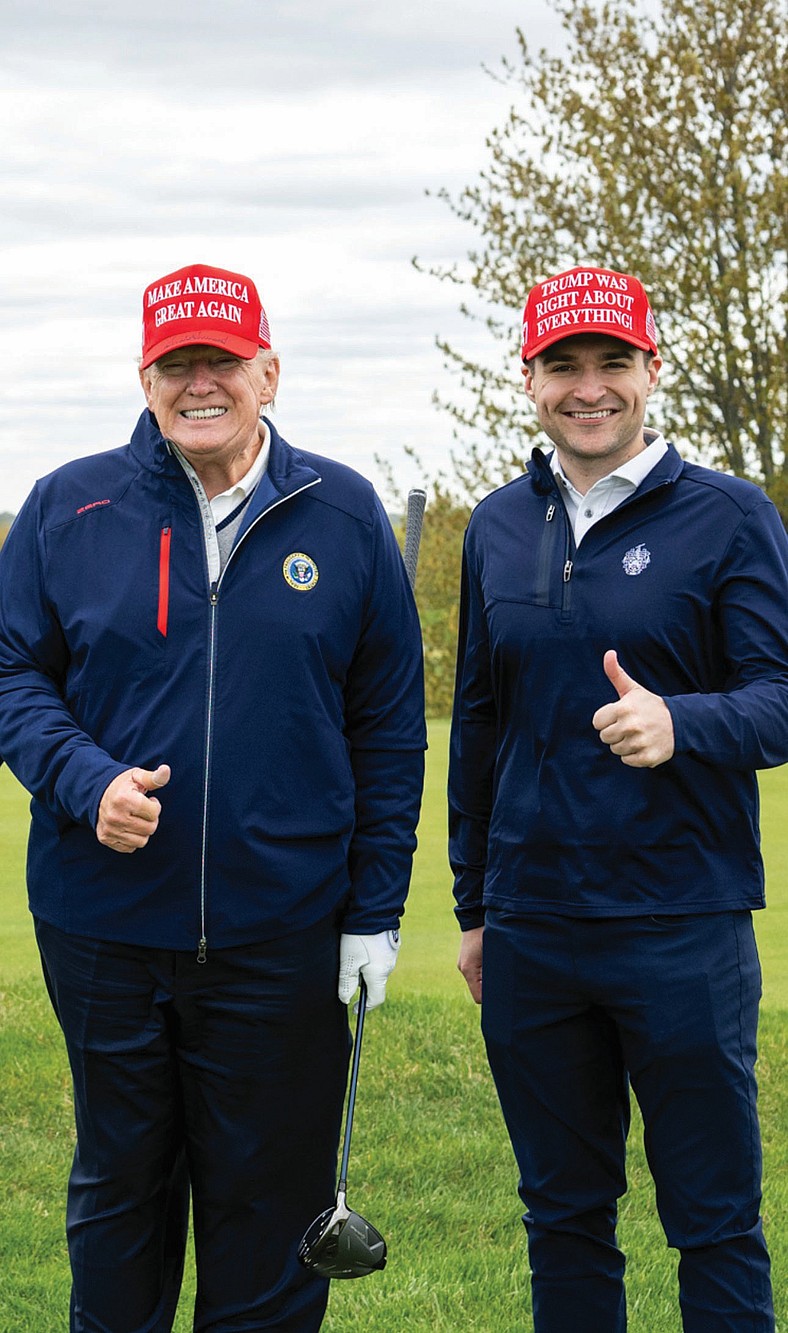How Alex Bruesewitz Used Social Media To Ascend In Washington And Become An Ally To The President
Th 28-year-old social media mastermind details his rise from trolling liberal teachers in sixth grade to running digital messaging for the Never Surrender PAC.

Back in 2015, just a month before graduating high school in small-town Wisconsin, Alex Bruesewitz fired off a tweet that altered the course of his life. It was a picture of Trump Tower Chicago with the caption: “The sign on Trump Chicago will look just as good in the White House.” Out of the blue, Donald Trump retweeted him. Two months later, he announced his run for president.
“I liked how Trump took time out of his day to share one of my posts,” Bruesewitz recalls. “I thought it was a huge deal. He built an ally for life, just basically doing that one interaction.” Fast forward to 2025. That 18-year-old kid from Ripon, Wisconsin, has become one of the most influential political strategists in America. Last year, Bruesewitz, now 28, was tapped by the Trump campaign to spearhead its podcast strategy, credited with helping the former president reach millions of new voters. Bruesewitz has been named senior adviser to Never Surrender, Trump’s new leadership PAC.
In this role, he leads digital messaging for the group, with his consulting firm X Strategies LLC managing all digital properties linked to the Trump political brand, including powerful social media accounts like @TrumpWarRoom and @TeamTrump with millions of followers. Most recently, Bruesewitz was named on the 2025 TIME100 Next, a list that spotlights changemakers from around the globe who are shaping the next generation of leadership and redefining what progress, influence, and impact mean in today’s world.
We sat down with Bruesewitz to learn how a kid from a town of 7,000 people became Donald Trump’s go-to social media mastermind.
Tell us about your upbringing in Ripon, Wisconsin. How did that shape you? Ripon is a very quaint community.
The employers are factories and farms and teaching—really small-town America vibes. Everybody knows each other. I had the same kids that I grew up with through K through 12. My graduating class was 110 kids. It was really a unique experience, but growing up there made me aspire to see the world and lit a fire in my belly to be more ambitious.

How did you get interested in politics at such a young age?
I was raised by a single mom who is as conservative as it gets. She worked long hours, and after school, we would watch the news, typically The O’Reilly Factor, maybe Hannity & Colmes. And then we would turn on Home Improvement. Every night, that’s how we would spend time together.
I always felt a bit contrarian. All my teachers were super liberal, and I liked to troll them. Every Friday in middle school, you had to find a news story, read it, and stand up in front of the class to summarize it. Then you had to read your source. My teacher would always yell at me because I’d always cite Fox News. She’d say, “Fox News is not a real news network.” Even in sixth grade, I was trolling my teacher.
You founded your company, X Strategies, when you were just 19. What does the company do?
My business partner Derek and I met right around the time that Trump was the Republican nominee in 2016, and we formed the company shortly after he got sworn in. The company’s goal was to help conservatives communicate online better in the age of Donald Trump. We would try to get clients to either let us run their social media accounts or give them advice on how to grow. My very first client was called Freedom Project Academy, a Christian conservative homeschool academy in Appleton, Wisconsin. They agreed to pay me a very small dollar amount each month to help manage their social media accounts. Eight years later, they’re still a client.
You’ve said social media has become the battleground of the political landscape. Can you explain what you mean by that?
President Trump brought the political discourse online in a way that nobody had done before. A lot of people claim that Barack Obama used X effectively. But Obama just posted on X. He didn’t interact. President Trump was the first social media president. X became the town square, the public square of political discourse. That’s where I focused most of my energy on building a following. It’s where folks in journalism get a lot of their news coverage from. It’s where TV rooms get their show rundown ideas. It became so important to have a presence there. Initially, my competitors were TV bookers. A lot of members of Congress were paying thousands of dollars to a booker to get them on Fox News once a month, and they thought that was a success. Instead, I tried to sell them on investing a few thousand bucks on their social media presence. It’s more tangible, makes you more relevant, and gives you more control over your message.
When did you first actually meet President Trump?
I didn’t meet the president until after he left office. I was working on a campaign for a guy named Max Miller who was running against Tony Gonzalez, who voted to impeach Trump. I first met Trump in a photo line at a rally. Shortly thereafter, I met him at a fundraiser in Naples, and he started becoming more familiar with me. Then we spent some time together more formally at a LIV Golf tournament, which was a great time.

How did you end up working on his 2024 campaign?
I didn’t formally work for the campaign until July 1, 2024, but I’ve been working with Don Jr. and a lot of the family for almost four years now. When I formally started, Susie Wiles tasked me with the podcast strategy. She asked me to oversee and spearhead the efforts to engage with online influencers. It was a super easy role for me because the president has so many friends and family members who are well-connected, and they all wanted to help him. I was basically just the liaison between all these cool people and the president, helping facilitate scheduling. It’s pretty funny—the media talks about how it was a brilliant strategy, but at the end of the day, these people have large platforms that reach millions of people. We have mutual friends, so people connected me via email or text, and then I just set up meetings or interviews. It was really that simple, and the president knocked it out of the park because he’s awesome.
What do you think was your biggest win during the campaign?
I think the Theo Von podcast was a great moment that showed a really unique side of the president. He was very engaged in some hilarious conversations with Theo, and the clips went insanely viral. Dana White actually introduced us to Theo, which we’re super grateful for. The Adin Ross interview that was set up by Barron was super fun. Barron set it up, and then I helped work with Adin and his team on their vision for the interview. Andrew Schulz is a great guy, too. That was one I really wanted the president to do. I’m a big Andrew Schulz fan—I think he’s an incredible person and a hilarious comedian. I worked hard to set that one up and actually made a trip down to Andrew’s studio in New York before they ended up having the interview.
What was particularly effective about these podcast appearances?
I always found it ridiculous and personally offensive when the media would describe Trump—this guy who I’ve gotten to know as funny, hilarious, and accomplished — as if he’s a crazy person or a monster. These podcasts gave him the medium to showcase the Donald Trump that we see privately—more comfortable, more relaxed, more fun and engaging, where he’s not defensive because he doesn’t have a host that’s viciously lying about him like the mainstream media does. What I also like about these podcasters is that they’re not political by nature. They also weren’t massive Trump fans—they were Trump-curious. It’s funny watching the media cover it as this “rightwing manosphere” when these guys aren’t right wing. Theo Von and Joe Rogan voted for Bernie Sanders in 2016. These guys are very liberal in many respects. It was fun watching the president interact with them and also watching the comment sections in real time. Trump won over all these people. You’d see comments like, “Wow, I didn’t know Trump was like this. He’s awesome,” or “That’s not how the media portrays him. The media just lies.” You could watch how Donald Trump on these podcasts was winning the hearts and minds of independent to left-leaning viewers because they finally got to see the real Donald Trump.
You didn’t go to college. What do you think about college these days? Do you have advice for younger people who are thinking about it?
Know what you want to do. It’s weird—when I was like 22, people would ask if I went to college, and when I said no, they’d give me looks like, “Oh, this idiot.” Fast forward to today, when I tell somebody I didn’t go to college, it’s “Alex, you were so smart! Great decision!” There’s been a total shift in thinking about higher education since I graduated high school, which has been almost 10 years now. I think it’s for the better. We had a system where everybody was kind of being turned out to be the same—the same K through 12 curriculum, not unique for the student. I didn’t like that path because I wanted to be different. The one-size-fits-all style of education has been a disaster for our country. Pretty early on, the education system figures out what the student is good at and what they’re not good at. But instead of trying to put them in lanes where they’re going to excel, they keep shoving stuff down their throats that they’re never going to pick up, learn, or appreciate. I’m not 100% anti-college. I think it can be necessary. I just don’t think it’s for everybody the way our education system has set it up.

What do you do for fun when you’re not working?
I play a lot of video games like NBA 2K, though I’m trying to cut back on that. I like to read, and I like to travel. I travel a lot. One of my favorite places to travel is actually Los Angeles. I’ve spent a lot of time there, and I have a lot of friends out there. I’ve been hanging out in Los Angeles since 2018, and it’s been fun watching the cultural shift. There are so many people you wouldn’t expect—rappers, musicians, athletes, actors—who hit me up just to hang out and talk politics. They’re Trump-curious, and a lot of these people that were offered money to support Kamala Harris’s campaign rejected it and voted for Trump instead. You would never expect a Republican political operative to be able to hang out in that world, but I love it.
